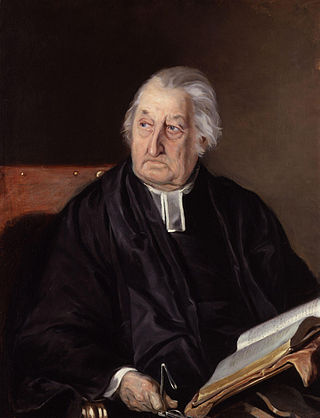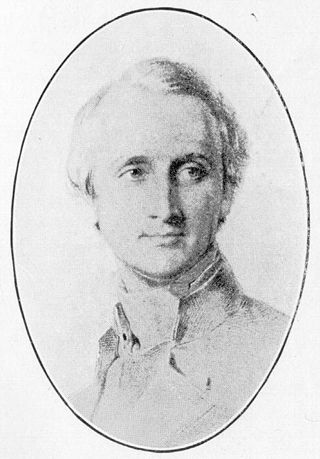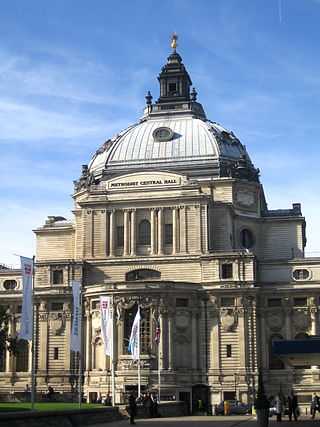Methodism, also called the Methodist movement, is a Protestant Christian tradition whose origins, doctrine and practice derive from the life and teachings of John Wesley. George Whitefield and John's brother Charles Wesley were also significant early leaders in the movement. They were named Methodists for "the methodical way in which they carried out their Christian faith". Methodism originated as a revival movement within Anglicanism with roots in the Church of England in the 18th century and became a separate denomination after Wesley's death. The movement spread throughout the British Empire, the United States and beyond because of vigorous missionary work, and today has about 80 million adherents worldwide.

John Wesley was an English cleric, theologian, and evangelist who was a principal leader of a revival movement within the Church of England known as Methodism. The societies he founded became the dominant form of the independent Methodist movement that continues to this day.
The Primitive Methodist Church is a Methodist Christian denomination within the holiness movement. It began in England in the early 19th century, with the influence of American evangelist Lorenzo Dow (1777–1834).
The Presbyterian Church of Wales, also known as the Calvinistic Methodist Church, is a denomination of Protestant Christianity based in Wales.

Primitive Methodism was a major movement in English and Welsh Methodism from about 1810 until the Methodist Union in 1932. It emerged from a revival at Mow Cop in Staffordshire. Primitive meant "simple" or "relating to an original stage"; the Primitive Methodists saw themselves as practising a purer form of Christianity, closer to the earliest Methodists. Although the denomination did not bear the name "Wesleyan", Primitive Methodism was Wesleyan in theology, in contrast to the Calvinistic Methodists.
Trefeca, located between Talgarth and Llangorse Lake in what is now south Powys in Wales, was the birthplace and home of the 18th-century Methodist leader Howell Harris (1714–1773),. It was also the site of two Calvinistic Methodist colleges at different times; the first sponsored by Selina, Countess of Huntingdon, in the late-18th century; the second supported by the Welsh Calvinistic Methodist Church in the later 19th century.
The Methodist Church of Great Britain is a Protestant Christian denomination in Britain, and the mother church to Methodists worldwide. It participates in the World Methodist Council, and the World Council of Churches among other ecumenical associations.

Rowland Hill A.M. was a popular English preacher, enthusiastic evangelical and an influential advocate of smallpox vaccination. He was founder and resident pastor of a wholly independent chapel, the Surrey Chapel, London; chairman of the Religious Tract Society; and a keen supporter of the British and Foreign Bible Society and the London Missionary Society. The famous instigator of penny postage, Rowland Hill, is said to have been christened 'Rowland' after him.

The Reformed Episcopal Church (REC) is an Anglican Church. It was founded in 1873 in New York City by George David Cummins, a former bishop of the Protestant Episcopal Church.

Jabez Bunting was an English Wesleyan Methodist leader and the most prominent Methodist after John Wesley's death in 1791.

Aubrey George Spencer was the first bishop of the Anglican Diocese of Newfoundland and Bermuda (1839–1843). He was also bishop of Jamaica. His brother George Spencer became Bishop of Madras. He is from the Spencer family.

George Hills was a Canadian Anglican bishop.

Christ Church Cathedral in Victoria, British Columbia is the cathedral church of the Diocese of British Columbia of the Anglican Church of Canada.

Thomas Coke was the first Methodist bishop. Born in Brecon, Wales, he was ordained as a priest in 1772, but expelled from his Anglican pulpit of South Petherton for being a Methodist. Coke met John Wesley in 1776. He later co-founded Methodism in America and then established the Methodist missions overseas, which in the 19th century spread around the world.
Elmfield College, York (1864–1932), originally called Connexional College or Jubilee College in honour of the Primitive Methodist Silver Jubilee in 1860, was a Primitive Methodist college on the outskirts of Heworth, York, England, near Monk Stray.

Selina Hastings, Countess of Huntingdon was an English Methodist leader who played a prominent part in the religious revival of the 18th century and the Methodist movement in England and Wales. She founded an evangelical branch in England and Sierra Leone, known as the Countess of Huntingdon's Connexion.

The organisation of the Methodist Church of Great Britain is based on the principle of connexionalism. This means that British Methodism, from its inception under John Wesley (1703–1791), has always laid strong emphasis on mutual support, in terms of ministry, mission and finance, of one local congregation for another. No singular church community has ever been seen in isolation either from its immediately neighbouring church communities or from the centralised national organisation. Wesley himself journeyed around the country, preaching and establishing local worshipping communities, called "societies", often under lay leadership. Soon these local communities of worshipping Christians formalised their relationships with neighbouring Methodist communities to create "circuits", and the circuits and societies contained within them, were from the very beginning 'connected' to the centre and Methodism's governing body, the annual Conference. Today, societies are better known as local churches, although the concept of a community of worshipping Christians tied to a particular location, and subdivided into smaller cell groups called "classes", remains essentially based on Wesley's societies.

The Wesleyan Methodist Church was the majority Methodist movement in England following its split from the Church of England after the death of John Wesley and the appearance of parallel Methodist movements.
Edward Jones, nicknamed "Ginshop" Jones, was a Welsh Calvinistic Methodist "exhorter" and lay preacher in London, who ended his life in disgrace.













